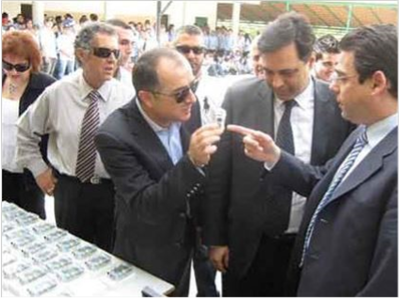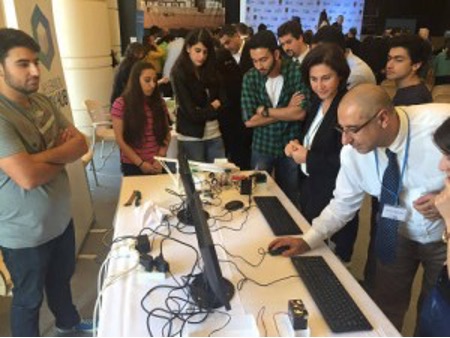Eliane Metni, President and Director of the International Education Association (IEA)
Candace Johnson, Founding President GTWN
In 2012 a number of GTWN Members (Janice Hughes, Bridget Cosgrave, Candace Johnson) started hearing about Raspberry Pi from their friends in Cambridge- Jack Lang, Hermann Hauser and Sherry Coutu.
The GTWN was already working with the United Nations on getting more girls to learn coding and programming. We realised that Raspberry Pi would be the perfect device to get more young people, especially girls, access to real computers and with that to learn how to code and program, particularly in the Middle East. We prevailed on the Raspberry Pi Foundation, in particular Jack Lang, at the time the head of the Computing Lab at Cambridge to provide for the project two of the first 10 Raspberry Pi’s that came off of the assembly line.[1] At the time, Liz Upton from the Raspberry Pi Foundation welcomed this initiative:
“We’re very pleased to see the Raspberry Pi being used to help educate children all over the world… Learning computing concepts equips kids with a formidable toolset of problem-solving skills and algorithmic thinking that they can apply to all areas of their lives; we’re delighted to see those skills being developed and shared by the children who are participating in this project. We wish them every success in the future.”
Now the group of GTWN members had to find someone who could put together a program in Arabic to help fashion educating young girls in the Middle East how to use the Raspberry Pi’s. Working through our international networks of colleagues, we cast the net wide and miraculously found Eliane Metni, President and Director of the International Education Association (IEA) and a French-English-Arabic speaking educator of computing and learning in Lebanon. Not only was she excited about the possibilities that Raspberry Pi offered, with her extensive background in education she also knew exactly how best to get the program started.
At first the two Raspberry Pi’s were used in one of the oldest, most prestigious private schools, high in the mountains of Lebanon. For even then, it was difficult in the Arab world to convince everyone that young girls should have access to computing! Together the GTWN members put together USD 5000 to get the program started. We were thrilled and honoured to be invited to the inauguration of the Youth to Youth program that Eliane Metni had created to teach young girls and boys how to code and program with the Raspberry Pi’s in the school. Well, actually, it was to first teach a group of young girls and boys and then to have them teach their other school mates, hence the name “Youth to Youth”!
The momentous day arrived when the GTWN was invited to the school in Lebanon to view the fruits of their investment. We were delighted to find that not only were there government ministers and educators from all around Lebanon attending the inauguration of the program, representatives of UNICEF were also present. Everyone was amazed when they could see what was possible using a Raspberry Pi.

UNICEF immediately saw the potential of the program for the Syrian Refugee camps in Lebanon and asked Eliane if she would consider putting the program and the Raspberry Pi’s (which consume almost no energy) into the camps. Of course she would! Not only that, she would use the opportunity to teach the children in the camps how to read and write and also how to become entrepreneurs. It was a huge success.
From there Eliane tirelessly added to the program, going from “”Youth to Youth” to “Coder Makers”. The GTWN continued its support by purchasing more Raspberry Pi’s and over the years, also extending the program from Lebanon to Kenya where “Youth to Youth” developed into “Mamas to Mamas”, particularly in the Maasai community, known for its color-coded beading.

The story continued and today, the Lebanese Government and the Mona Boutros foundation have instigated an initiative to put Raspberry Pi’s, the Youth to Youth program and the Coder Maker program in all the public schools in Lebanon.
Upon learning the news of this initiative, one of the GTWN’s original supporters Sherry Coutu, CBE, Member of the Raspberry Pi Foundation Board and philanthropist working in education, http://www.linkedin.com/in/coutu, wrote: “This is simply joyous to receive-Thank you so much!!!”
Eliane recalls the path to success of the program and the role that the GTWN has played in it:
“The GTWN initiative has helped us to be where we are today and to scale digital transformation with the Raspberry Pis at a national level. We started with 2 Raspberry Pis that the GTWN had sent us and partnered with UNICEF to work with refugees. Slowly, but surely, we made our way into public schools with our partners from the Mouna Bustros Foundation.
Those first two Raspberry Pis that the GTWN had sent to Lebanon with subsequent deliveries, were the base of our Youth-to-Youth program and today the “Coder Maker”. Slowly but surely, year after year, we made our way into mainstream learning in the Lebanese Education system…We have achieved the absolutely ground-breaking program we have set out in a country which defies defeat and sees education in the Digital Society as the way forward. Thank you for all your support, I couldn’t have done it without you.”
[1] Details of the project and its aims were first reported in the 2015 edition of The Mobile Century.[1]




